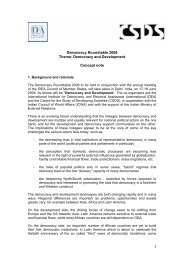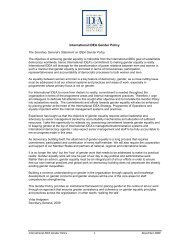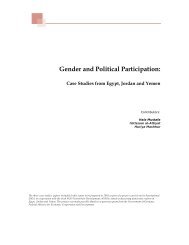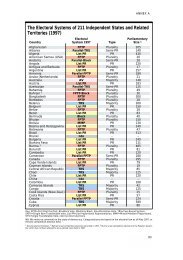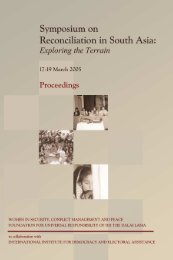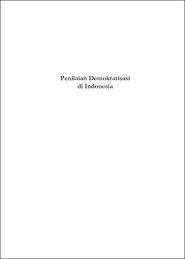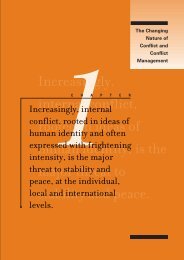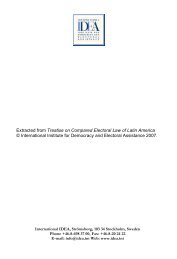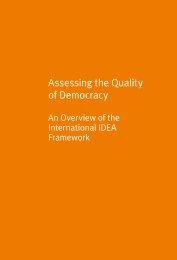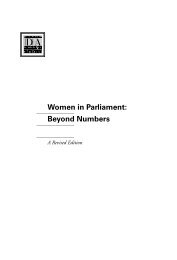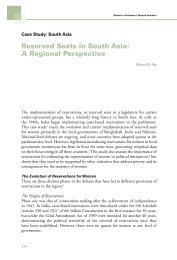The Role of State Constitutions in Protecting ... - International IDEA
The Role of State Constitutions in Protecting ... - International IDEA
The Role of State Constitutions in Protecting ... - International IDEA
Create successful ePaper yourself
Turn your PDF publications into a flip-book with our unique Google optimized e-Paper software.
But by its very nature, it is an <strong>in</strong>herently fragile achievement, ever cont<strong>in</strong>gent on<br />
the skills <strong>of</strong> the political actors <strong>in</strong> work<strong>in</strong>g out the power shar<strong>in</strong>g arrangements or<br />
<strong>in</strong> allow<strong>in</strong>g the mechanisms <strong>of</strong> self-correction to work themselves out. This is a<br />
lesson well worth remember<strong>in</strong>g as India confronts the most organized challenge<br />
to the politics <strong>of</strong> diversities <strong>in</strong> the form <strong>of</strong> the right w<strong>in</strong>g H<strong>in</strong>dutva government<br />
at the centre. <strong>The</strong> most serious challenge to the survival <strong>of</strong> diversities comes from<br />
forces which are less organized, less visible and may not even be considered<br />
political <strong>in</strong> the ord<strong>in</strong>ary sense: forces <strong>of</strong> cultural homogenization, the<br />
monoculture <strong>of</strong> modernity and the ideology <strong>of</strong> nation-state. While there is –<br />
someth<strong>in</strong>g to be said for the capacity <strong>of</strong> democratic politics to deal with the more<br />
obvious and political challenges to diversity, it has proved a very weak ally <strong>in</strong> the<br />
struggle aga<strong>in</strong>st these deeper threats from with<strong>in</strong>.<br />
In other words it is not an unmixed record, but on balance someth<strong>in</strong>g <strong>of</strong> a success.<br />
Now, what accounts for this success (to the extent to which it is so)? Those who<br />
study Indian democracy have <strong>of</strong>fered three accounts <strong>of</strong> this success. Schematically,<br />
the explanation could reside one <strong>of</strong> the follow<strong>in</strong>g:<br />
◆<br />
◆<br />
◆<br />
<strong>The</strong> nature <strong>of</strong> Indian society and civilization<br />
<strong>The</strong> provisions <strong>of</strong> the Indian constitution<br />
<strong>The</strong> nature <strong>of</strong> competitive politics <strong>in</strong> India s<strong>in</strong>ce <strong>in</strong>dependence<br />
While there is a lot to be said <strong>in</strong> favor <strong>of</strong> the first two explanations, <strong>in</strong> the last<br />
<strong>in</strong>stance, the Indian enterprise has worked because <strong>of</strong> the third factor. This is<br />
someth<strong>in</strong>g that tends to be ignored <strong>in</strong> studies <strong>of</strong> constitutional law and political<br />
<strong>in</strong>stitutions. Given the mandate <strong>of</strong> this workshop, it is useful to focus on the<br />
constitutional provisions, even if that is not the pr<strong>in</strong>ciple locus <strong>of</strong> explanation.<br />
<strong>The</strong> social context is worth mention<strong>in</strong>g before turn<strong>in</strong>g to a detailed analysis <strong>of</strong> the<br />
<strong>in</strong>stitutional-constitutional features and conclud<strong>in</strong>g on a note on the political<br />
dynamics.<br />
<strong>The</strong> societal context<br />
It is <strong>of</strong>ten said that the nature <strong>of</strong> the Indian society and culture is uniquely suited<br />
to the success <strong>of</strong> the federal enterprise <strong>of</strong> safeguard<strong>in</strong>g the <strong>in</strong>terest <strong>of</strong> the<br />
m<strong>in</strong>orities. <strong>The</strong> argument <strong>in</strong>volves reference to India’s traditions <strong>of</strong> religious<br />
tolerance, the open-ended nature <strong>of</strong> the H<strong>in</strong>du religion. While there is an element<br />
<strong>of</strong> truth <strong>in</strong> this, this may not guide us <strong>in</strong> the right direction. It is not clear if the<br />
Indian traditions are unique <strong>in</strong> religious tolerance or particularly resistant to the<br />
modern forces <strong>of</strong> homogenization. As for the nature <strong>of</strong> H<strong>in</strong>du religion, at least the<br />
modern version <strong>of</strong> political H<strong>in</strong>duism has been as bigoted and <strong>in</strong>tolerant as<br />
anyth<strong>in</strong>g else seen <strong>in</strong> modern world.<br />
<strong>The</strong>re is someth<strong>in</strong>g else about the Indian society that does help growth <strong>of</strong><br />
federalism and democracy. <strong>The</strong> nature <strong>of</strong> multiple and cross-cutt<strong>in</strong>g social<br />
22



